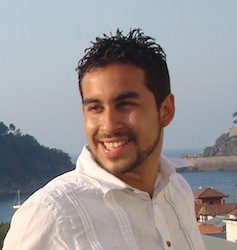Research
I study the social lives of viruses. Viruses frequently infect the same host, leading to conflicts of interest over host resources. Viruses can evolve strategies to contend with co-infecting viruses, ranging from exploiting other viruses to synergistically interacting to increase their reproduction. My research focuses on the evolution, ecology, and molecular mechanisms of these virus-virus interactions using genomics, experimental evolution, and environmental microbiology.
I currently study genetic exchange in segmented RNA viruses, including Cystovirus phages that infect Pseudomonas bacteria and influenza viruses. The genome of these viruses is divided into segments. Sex occurs when phages swap their segments while reproducing within a cell (reassortment). Reassortment is an important factor in determining the capacity to infect new hosts, evade immune responses or vaccines, and adapt to new environments.
My entry into microbial evolution started under the mentorship of Dr. Lin Chao (UCSD) and Dr. Paul E. Turner (Yale), following my doctoral research on cooperatively breeding tamarin monkeys in Panama. I conducted postdoctoral research on the spatial dynamics of bacteria and viruses on leaf surfaces with Dr. Steven E. Lindow and Dr. Ellen Simms at UC Berkeley. I studied social interactions, evolution, and ecology of phage as a Faculty Fellow at NYU's Center for Genomics and Systems Biology. I am currently an NIH Pathway to Indepence Fellow in Elodie Ghedin's lab studying reassortment in influenza viruses
Previous Research
My doctoral research focused on the behavior, ecology, and genetics of tamarin monkeys (Saguinus geoffroyi) in the forests of Panama. I was especially interested in the evolution of cooperative male parental care. Male parental care is rare among mammals, even when they are monogamous. In tamarin groups, two or more males mate with a single female and cooperate to rear her twin young. Why, from an evolutionary perspective would tamarins do this? I used multi-year demographic and genetic data to show that male pairs are stable across years, are related, and share paternity. Recent anthropological work suggests that early humans may have been cooperative breeders and tamarins (among the only cooperatively breeding primates) may contribute to understanding the origins of human cooperation.
Publications
- Wilcox AH, Delwart E, Diaz Munoz SL (in review) Next-generation sequencing of double stranded RNA is greatly improved by treatment with the inexpensive denaturing reagent DMSO bioRxiv Preprint PDF | Data and Code
- Edwards RA, & co-authors incl Diaz Munoz SL (2019) Global phylogeography and ancient evolution of the widespread human gut virus crAssphage Nature Microbiology 4: 1727–1736 PDF | Data and Code
- Diaz Munoz SL (2019) Uncovering Virus-Virus Interactions by Unifying Approaches and Harnessing High-Throughput Tools mSystems 4(3): e00121-19. PDF
- Tucker MA, & 100+ co-authors incl Diaz Munoz SL (2018) Moving in the Anthropocene: Global reductions in terrestrial mammalian movements Science 359(6374): 466-469. PDF
- Diaz Munoz SL, Sanjuan R, West S (2017) Sociovirology: conflict, cooperation, and communication among viruses Cell Host & Microbe 22(4): 437-441. PDF
- Diaz Munoz SL (2017) Viral coinfection is shaped by host ecology and virus-virus interactions across diverse microbial taxa and environments Virus Evolution 3(1): vex011. PDF | Data
- Diaz Munoz SL, Boddy A, Dantas G, Waters CM, Bronstein JL (2016) Contextual organismality: beyond pattern to process in the emergence of organisms Evolution 70(12): 2669-2677. PDF
- Diaz Munoz SL (2016) Complex cooperative breeders: Using infant care costs to explain variability in callitrichine social and reproductive behavior American Journal of Primatology 78(3): 372-387.PDF | Data
- Diaz Munoz SL and Bales KL (2016) "Monogamy" in Primates: Variability, Trends and Synthesis American Journal of Primatology 78(3): 283-287. PDF
- Diaz Munoz SL and Koskella B (2014) Bacteria-Phage interactions in natural environments Advances in Applied Microbiology 89: 135-183. PDF
- Diaz Munoz SL, DuVal EH, Krakauer AH, Lacey EA (2014) Cooperating to compete: Altruism, sexual selection, and male coalitions Animal Behaviour 88: 67-78. PDF | Data
- Diaz Munoz SL and Ribeiro AM (2014) No sex-biased dispersal in a primate with an uncommon social system - cooperative polyandry PeerJ 2: e640. PDF | Data
- Diaz Munoz SL, Tenaillon O, Turner PE, Chao L (2013) Experimental reassortment of environmental isolates confirms geographic differences in reassortment in Cystoviruses BMC Evolutionary Biology 13: 206. PDF | Data
- Guerrero-Medina G, Feliu-Mojer M, Gonzalez-Espada W, Diaz-Munoz G, Lopez M, Diaz Munoz SL, Fortis- Santiago Y, Perez-Otero J, Craig D, Colon-Ramos DA (2013) Supporting diversity in science through social networking PLoS Biology 11(12): e1001740. PDF
- Diaz Munoz SL (2012) Role of recent and old riverine barriers in fine scale population genetic structure of Geoffroy's Tamarin (Saguinus geoffroyi) in the Panama Canal Watershed Ecology and Evolution 2: 298-309. PDF | Data
- Diaz Munoz SL (2011) Paternity and relatedness in
a polyandrous nonhuman primate: testing adaptive hypotheses of male reproductive
cooperation Animal Behaviour 82: 563-571. PDF
Press: Scientific American magazine's Not Bad Science column; New Scientist magazine's Zoologger column - Calisi RM, Diaz Munoz SL, Wingfield JC and Bentley
GE (2011) Social and breeding status are associated with the expression
of GnIH Genes, Brain and Behavior 10: 557-564. PDF
Featured on the journal's volume cover
2019
2018
2017
2016
2014
2013
2012
2011
Grants and Awards
- NIH Pathway to Independence Fellow (K99/R00) 2016-Present, New York University
- UC Berkeley Chancellor's Postdoctoral Fellowship 2013-2014, University of California, Berkeley
- NSF Postdoctoral Research Fellowship in Biology 2010-2013, University of California, San Diego
- National Academies Ford Predoctoral Fellowship 2004-2009, University of California, Berkeley
- NSF Doctoral Dissertation Improvement Grant 2006, University of California, Berkeley

